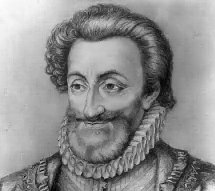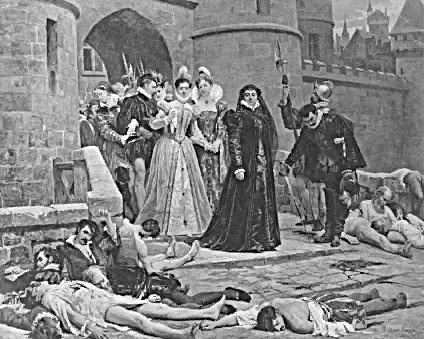 enry IV (1553-1610), king of France and
Navarre, third son of Antoine de Bourbon, Duke of Vendôme, and
Jeanne d’Albret of Navarre and Béarn became king of Navarre
in 1562. He married Marguerite of Valois, sister of Charles IX of
France. On the death of Henry III Henry of Navarre became (1589)
the lawful king of France. In 1598 Henry granted the Huguenots
the Edict of Nantes. The wars had left France in an exhausted
condition, and Henry’s great minister, Sully, did much to
restore its prosperity. He imposed new taxes, he enforced economy,
he encouraged agriculture, while Henry introduced the silk
industry into France. On April 14, 1610, Henry was assassinated
at Paris by Ravaillac. See Baird’s The Huguenots and
Henry of Navarre (1886), Willert’s Henry IV (1893).
[World Wide Illustrated Encyclopedia, 1935]
enry IV (1553-1610), king of France and
Navarre, third son of Antoine de Bourbon, Duke of Vendôme, and
Jeanne d’Albret of Navarre and Béarn became king of Navarre
in 1562. He married Marguerite of Valois, sister of Charles IX of
France. On the death of Henry III Henry of Navarre became (1589)
the lawful king of France. In 1598 Henry granted the Huguenots
the Edict of Nantes. The wars had left France in an exhausted
condition, and Henry’s great minister, Sully, did much to
restore its prosperity. He imposed new taxes, he enforced economy,
he encouraged agriculture, while Henry introduced the silk
industry into France. On April 14, 1610, Henry was assassinated
at Paris by Ravaillac. See Baird’s The Huguenots and
Henry of Navarre (1886), Willert’s Henry IV (1893).
[World Wide Illustrated Encyclopedia, 1935]
The death of the Duke of Anjou in 1574 made Henry the
presumptive heir to the French crown, the succession of which was
opened to him by the assassination of King Henry III in 1589. He
was a Protestant and obnoxious to most of the nation. But after
he renounced his Protestantism peace was assured. Assassinated by
a fanatic named Ravaillac as Henry was about to set out to
commence war with Germany. Succeeded by his son Louis XIII. {Chamber’s
Biographical Dictionary} [GADD.GED]
 Henry IV (of France) (1553-1610),
king of France (1589-1610), who restored stability after the
religious wars of the 16th century. He was the first of the
Bourbon kings of France and also, as Henry III, king of Navarre (1572-1610).
Henry IV (of France) (1553-1610),
king of France (1589-1610), who restored stability after the
religious wars of the 16th century. He was the first of the
Bourbon kings of France and also, as Henry III, king of Navarre (1572-1610).
Henry was born at Pau in Navarre. His father, Antoine de
Bourbon, duc de Vendôme, was descended in the ninth generation
from the 13th-century king of France, Louis IX. His mother,
Jeanne d'Albret, was queen of Navarre and niece of King Francis I
of France.
 The Wars of Religion
The Wars of Religion
Although baptized a Roman Catholic, Henry was brought up as a
Calvinist by his strong-minded mother, a leader of the French
Protestant (Huguenot) movement, which during the 1560s became
involved in a series of civil wars with the Catholics. Henry's
wedding in 1572 to Margaret of Valois, sister of the reigning
monarch, Charles IX, was followed by the massacre of thousands of
Huguenots (see Saint Bartholomew's Day, Massacre of).
Henry saved his own life by converting to Roman Catholicism, but
he remained a prisoner at court until 1576. After his escape he
repudiated his conversion and assumed the leadership of the
Huguenots. He was excommunicated in 1584, when he became the
immediate heir to the French throne.
Military Leader
Henry's storming of the fortress town of Cahors in 1580
launched his career as an intrepid military leader. He won
another brilliant victory at Coutras in 1587 in the war known as
the War of the Three Henrys, and two years later formed an
alliance with Henry III (the last French king from the Valois
dynasty), against the Holy League, dominated by the Guise family.
When the Valois king was murdered by a league fanatic in 1589,
Henry became king of France as Henry IV.
Backed by Spain and the pope, however, the league refused to
acknowledge a Protestant as king of France, and many Catholic
nobles who had served Henry III against the league deserted the
royal army. Henry won victories over the league at Arques and
Ivry and besieged the league stronghold, Paris, which was
eventually relieved by a Spanish army from the Netherlands. Henry
skillfully exploited divisions among members of the league, and
in 1593 he disarmed his opponents by announcing his reconversion
to Catholicism. A year later he bribed the league commander of
the capital to admit his army. One by one, he defeated or bought
over the magnates of the house of Guise who continued to resist.
Although Henry had defeated many of his opponents, he still
needed to be accepted by the papacy. He appealed to the pope to
lift his excommunication. In 1595 the pope, who wanted to avoid a
schism in the church, agreed to grant Henry absolution under
certain conditions: the church kept all its properties and assets
within France and Henry agreed to raise his heir, Louis XIII, as
a Roman Catholic. In 1598, Henry made peace with the Spanish. The
same year he proclaimed the Edict of Nantes, which granted
partial religious freedom to the Huguenots. These acts ended all
serious resistance to his reign.
Henry as King
In 1599 Henry secured papal annulment of his first marriage,
and the year after he married Marie de Médicis, a distant cousin
of the mother of the last Valois kings. His leading minister,
Maximilien de Béthune, duc de Sully, reorganized the finances
and promoted the economic recovery of France after decades of
civil war. Agriculture, manufacturing, and commerce were
encouraged; taxes on the peasantry were reduced; and a debt
moratorium relieved pressure on the nobility. The system by which
officials in finance and the judiciary purchased their offices
from the Crown was formalized in 1604 by a tax on office known as
the paulette. At the same time Sully substituted royal
officers for those employed by local representative bodies.
In 1609 Henry began preparations to intervene in Germany
against the Catholic Habsburg dynasty, a move that was opposed by
some French Catholics. The king was about to join his army when
he was assassinated by a Catholic extremist.
Henry IV's genial informality, bravery, gallantry,
perseverance in adversity, and readiness to bend religious
principle to political advantage have earned him a special place
in French history. Not only did he restore order and prosperity
to his ruined kingdom, but he also ensured that the monarchy
would be Catholic and absolutist.
Contributed By: J. H.M. Salmon [Microsoft Encarta 98
Encyclopedia]
 Back
Back
 enry IV (1553-1610), king of France and
Navarre, third son of Antoine de Bourbon, Duke of Vendôme, and
Jeanne d’Albret of Navarre and Béarn became king of Navarre
in 1562. He married Marguerite of Valois, sister of Charles IX of
France. On the death of Henry III Henry of Navarre became (1589)
the lawful king of France. In 1598 Henry granted the Huguenots
the Edict of Nantes. The wars had left France in an exhausted
condition, and Henry’s great minister, Sully, did much to
restore its prosperity. He imposed new taxes, he enforced economy,
he encouraged agriculture, while Henry introduced the silk
industry into France. On April 14, 1610, Henry was assassinated
at Paris by Ravaillac. See Baird’s The Huguenots and
Henry of Navarre (1886), Willert’s Henry IV (1893).
[World Wide Illustrated Encyclopedia, 1935]
enry IV (1553-1610), king of France and
Navarre, third son of Antoine de Bourbon, Duke of Vendôme, and
Jeanne d’Albret of Navarre and Béarn became king of Navarre
in 1562. He married Marguerite of Valois, sister of Charles IX of
France. On the death of Henry III Henry of Navarre became (1589)
the lawful king of France. In 1598 Henry granted the Huguenots
the Edict of Nantes. The wars had left France in an exhausted
condition, and Henry’s great minister, Sully, did much to
restore its prosperity. He imposed new taxes, he enforced economy,
he encouraged agriculture, while Henry introduced the silk
industry into France. On April 14, 1610, Henry was assassinated
at Paris by Ravaillac. See Baird’s The Huguenots and
Henry of Navarre (1886), Willert’s Henry IV (1893).
[World Wide Illustrated Encyclopedia, 1935] Henry IV (of France) (1553-1610),
king of France (1589-1610), who restored stability after the
religious wars of the 16th century. He was the first of the
Bourbon kings of France and also, as Henry III, king of Navarre (1572-1610).
Henry IV (of France) (1553-1610),
king of France (1589-1610), who restored stability after the
religious wars of the 16th century. He was the first of the
Bourbon kings of France and also, as Henry III, king of Navarre (1572-1610). The Wars of Religion
The Wars of Religion